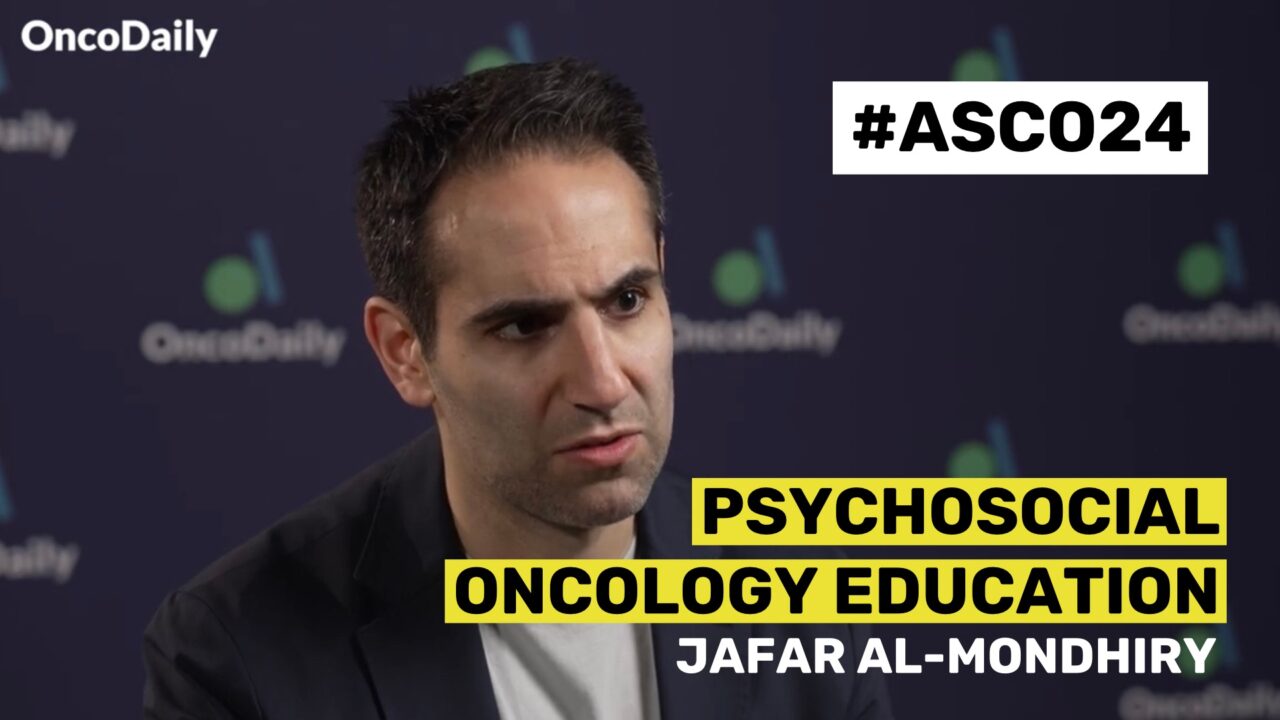The American Society of Clinical Oncology (ASCO) Annual Meeting is one of the largest and most prestigious conferences in the field of oncology. This year, the meeting took place from May 31 to June 4 in Chicago, Illinois. The event gathers oncologists, researchers, and healthcare professionals from around the world to discuss the latest advancements in cancer research, treatment, and patient care. Keynote sessions, research presentations, and panel discussions are typically part of the agenda, providing attendees with valuable insights into emerging trends and innovations in oncology.
This year, OncoDaily was at ASCO 2024 for the first time covering the meeting on-site. We had the pleasure of interviewing researchers who summarized the highlights of their work.
In this video, Dr. Jafar Al-Mondhiry, a medical oncologist at Inova Schar Cancer Institute and assistant professor at the University of Virginia, shared insights on ‘Artful oncology: A comprehensive psychosocial oncology curriculum for hematology/oncology fellows.‘
So my name is Dr. Al-Mondhiry. I’m a medical oncologist in the division of melanoma and skin cancer at InovaShark Cancer Institute in Fairfax, Virginia, and just outside of Washington, D.C. I’m also an assistant professor of medical education at University of Virginia Inova campus. So our work focuses on the first interim analysis of the implementation of our comprehensive psychosocial oncology curriculum for hematology oncology fellows, first implemented in 2022, and we’re here to present our first interim analysis at 2023.
The artful oncology curriculum is really based around four key pillars, and that are monthly didactics for our hematology oncology fellows with embedded micro skill development around how to support patients, a bi-monthly narrative medicine reflective seminar where we look at evocative works of short stories, essays, articles, poems, and podcasts that really reflect the clinician experience in supporting patients with significant psychosocial distress.
We also perform quarterly communication skills training with a geriatrics and palliative care trained communication skills facilitator. Finally, we embed our fellows in longitudinal patient support groups as co-facilitators so that they understand the survivorship experience of patients with cancer along the continuum of their hematology oncology training experience.
And so we highlight that this is the first published curriculum focusing on American Psychosocial Oncology Society curriculum content domains as published in 2022.
We also note that at our first interim analysis in 2023, we saw that our didactics were rated as highly relevant, actionable, and would recommend these sessions to others by our fellows with an average on a five-point Likert scale that exceeded 4.5 on all domains. Our fellows also note that the communication skills training improved their self-evaluated communication skills training proficiencies coming from a composite average of 4.4 in 2022 up to 7.4 with improvements in across all major domains.
The curriculum also showed that there were improvements in psychosocial attitudes towards patient care as measured by the physician belief scale. Limitations of our study include the small number of fellows. This is a new fellowship program with currently six fellows to date, making statistical analysis infeasible.
This is also a single center study design with some unique cancer center resources where we do our work in Fairfax. Our final limitation is that this is a very early or short-term follow-up on this curriculum with our first year of full implementation. However, data collection is ongoing with additional metrics being added throughout the continued implementation of this curriculum.
So we feel very strongly that this is an ambitious and exciting attempt at supporting our fellows and learning about this really critical part of patient care. We know that psychosocial distress affects up to 46% of patients with advanced cancers and can be linked to not only increased rates of depression and anxiety, but also all-cause mortality, increased length of stay in the hospital, as well as increased expenditures and cost of care. So we are very pleased with these interim analysis and we look forward to the next or the continued implementation of this curriculum and continued data collection of our curriculum.
We thank the Scientific Committee of ASCO for allowing us to present this year and we thank all of our supporters in the development of this curriculum, which is very much a group effort.
More videos and content from ASCO 2024 on OncoDaily.


